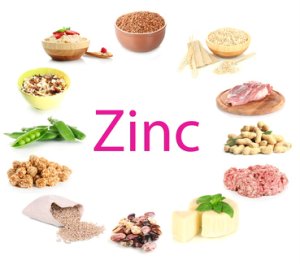Zinc prevents tumor growth and many people lack the nutrient
 Earlier studies have shown that zinc plays an important role for our health and for preventing esophageal cancer. However, it has been a puzzle to science to understand how zinc protects against this widespread cancer form. Now, Professor Zui Pan and a team of researchers from the University of Texas at Arlington, USA, have identified the mechanisms through which zinc protects healthy cells and prevents cancer cells from spreading in the esophagus. The scientists behind the new study believe that zinc given in the right dosages has a great potential for helping to prevent the disease and serving as an adjuvant in therapy. Their study is published in The FASEB Journal.
Earlier studies have shown that zinc plays an important role for our health and for preventing esophageal cancer. However, it has been a puzzle to science to understand how zinc protects against this widespread cancer form. Now, Professor Zui Pan and a team of researchers from the University of Texas at Arlington, USA, have identified the mechanisms through which zinc protects healthy cells and prevents cancer cells from spreading in the esophagus. The scientists behind the new study believe that zinc given in the right dosages has a great potential for helping to prevent the disease and serving as an adjuvant in therapy. Their study is published in The FASEB Journal.
We get zinc from different food items such as oysters, shrimp, meat, dairy products, nuts, kernels, and beans. However, there is a widespread problem with deficiencies, either because there is too little zinc in the diet, or because of factors that inhibit our ability to absorb and utilize the nutrient.
Zinc supports a great number of proteins and around 300 different enzymes that control our metabolism, fertility, nervous system, immune system, and a host of other functions. Zinc is also an important antioxidant that protects cells against free radicals, which are aggressive molecules with the ability to attack cellular DNA and promote the development of cancer.
Esophageal cancer is common, and new therapies are needed
According the National Cancer Institute in the United States, esophageal cancer is the sixth most common cause of cancer death globally. Although therapies have improved, people diagnosed with esophageal cancer only have a 20 percent chance of surviving the first five years after the disease is discovered. The statistic speaks its own clear language, and there is a great need for new therapies for preventing and treating this cancer form.
Facts on esophageal cancer
|
Many cancer patients lack zinc
Clinical and animal studies have demonstrated that zinc is essential for all cells in the body. A zinc deficiency makes it difficult for cells to function properly. According to Professor Zui Pan, zinc deficiencies are common among cancer patients. Until recently, science had no clue as to why having optimal zinc concentrations in the body helps prevent cancer cells from proliferating while, at the same time, allowing healthy cells to replenish themselves.
The link between zinc, calcium, and esophageal cancer
Professor Zui Pan and her team of researchers observed that zinc has a specific ability to block certain calcium channels in esophageal cancer cells. It is already known that these calcium channels (Orai1) promote the spreading of cancer cells if the calcium signalling is too overwhelming. Zinc’s ability to block the calcium channel can therefore prevent these cancer cells from proliferating. The scientists also discovered that zinc does not affect the calcium channels in healthy cells. According to Zui Pan, this is the first time ever that science has managed to demonstrate how zinc blocks overactive calcium channels in cancer cells. There even seems to be a biochemical link between zinc and calcium.
Did you know that 99 percent of the body’s calcium is stored in hard tissues like bones and teeth. All the cells in soft tissues (muscles, skin, etc.) must be virtually devoid of calcium.
Zinc’s potential role in prevention and therapy
In the future, Professor Zui Pan and her colleagues plan to take a closer look at the biochemical link between zinc and calcium signalling and to look into the possibility of using zinc supplements to fight esophageal cancer. They believe we get enough zinc from our diets, but supplements may be worth considering.
Zinc sources and things that deplete your zinc levels
As mentioned earlier, zinc is found in various foods such as shellfish, meat, dairy products, nuts, kernels, and beans. Zinc from animal sources are absorbed the best. The body’s absorption of zinc is impaired by e.g. sugar, birth control pills, inorganic iron supplements, and ageing.
Although severe zinc deficiencies are rarely seen in our part of the world, light and moderate zinc deficiency is somewhat common. It is therefore important to get enough of this nutrient – both to prevent cancer and as a part of cancer therapy.
Zinc’s cancer-preventing mechanisms
|
Choose organic zinc supplements, which the body can absorb and utilize
Many zinc supplements contain inorganic zinc sources like zinc sulphate or zinc oxide, which are difficult for the body to absorb. Always make sure to study the label to see what is in the product. The body can easily absorb and utilize organic sources like zinc gluconate and zinc acetate.
The following increases your need for zinc
|
References
Sangyong Choi et al. Selective inhibitory effects of zinc on cell proliferation in esophageal squamous cell carcinoma through Orai1. The FASEB Journal 2017
Zinc can halt the growth of cancer cells, study says. University of Texas. 2017
https://www.sciencedaily.com/releases/2017/09/170928121656.htm
Honor Whiteman . Zinc may help to prevent, treat esophageal cancer. MedicalNewsToday.2017
https://www.medicalnewstoday.com/articles/319594.php
https://www.news-medical.net/news/20171002/Zinc-may-help-stop-growth-of-esophageal-cancer.aspx
https://homeremediestv.wordpress.com/2017/09/30/stop-cancer-cell-growth-by-getting-concentrations-of-zinc-regularly-destroy-cancer-tumors-with-zinc/
https://www.cancer.dk/spiseroerskraeft-oesofaguscancer/kort-om-spiseroerskraeft-oesofaguscancer/
Search for more information...
- Created on .








